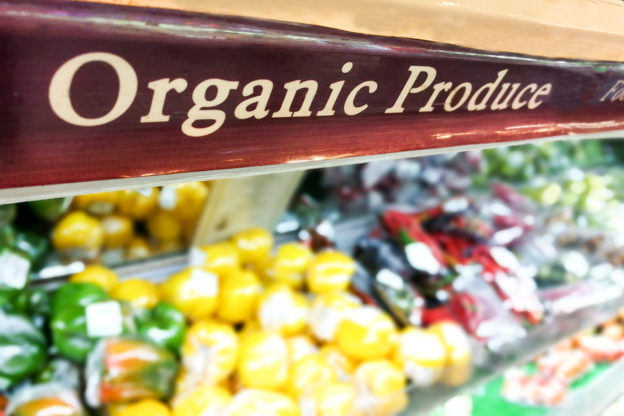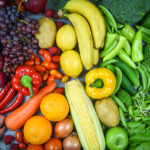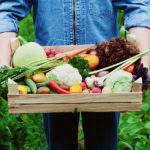By David Blyweiss, M.D., Advanced Natural Wellness
April 26, 2019
Most of my new patients are in for a surprise the first time they visit my office.
After I examine them, take their blood pressure, draw blood, so on and so forth, they expect me to pat them on the shoulder and send them home with a prescription.
That doesn’t normally happen at my clinic.
Instead, after the exam we go to my office for a long chat. We talk about all sorts of things. Their mental state and stress levels. How much sleep and exercise they get. What they eat.
And when they leave my office, they usually have a long list of health-oriented recommendations in hand instead of a prescription.
But, by far, the advice new patients often have the hardest time fully grasping is their food choices.
MD Exposes the Hidden Danger to Your Eyes

When your eyesight starts to fail, it's a real problem. Suddenly you can't go to the grocery store... you can't get to the doctor if you have an emergency... you can't meet your friends for dinner…
Your "regular" doctor doesn't have time to keep up with the latest research. And the same goes for eye doctors. They go to school to learn how to fit you for glasses and contacts, but have no way of preventing the damage and loss of eyesight that threatens your freedom and independence.
Let me show you something that explains a LOT about how your eyes work.
In my FREE Special Report, I'll show you a HUGE, untapped resource for your eyes that safely and naturally restores clear, effortless eyesight.
Click here to get started...
It often takes months of back-and-forth discussions to convince patients to give up healthy-sounding processed foods, commercial meats and artificial sweeteners…. and replace them with a wide variety of antioxidant-rich fruits and vegetables.
Most of them eventually make the switch. And I’m proud of them for that.
But then I have an entirely new problem: Persuading them to pass up on conventionally grown fruits and veggies and zero in on fresh, natural, ORGANIC produce instead.
A lot of folks have the same arguments…
“They both taste the same, so what difference does it make”… “Don’t worry, I always wash them real good first”… “That’s all right. I never eat the skin.”
Well I have three pieces of stunning news for you today.
Conventional produce has inferior antioxidant value. Plant-based foods are where the majority of powerful, disease-fighting antioxidants in your diet come from.
I’m talking about compounds like flavonones, anthocyanins and stilbenes that slash inflammation, help prevent cells from mutating and protect against cancer.
But get this…
Are You Suffering From...
- Love handles and a pot belly
- Romance that isn't what it used to
- Forgetfulness and inattention
- Low (or no) strength and endurance
- A sex drive that's shifted into neutral...or worse
If so...you may have Mature Male Burnout. Click here to discover more about this unique condition and what you can do about it.
Compared to commercial fruits and vegetables, organic produce contains up to 69% more flavonones, 51% more anthocyanins and 28% more stilbenes.
Remember. Food is information; for your cells and for your genes and because of this, food is medicine. And you don’t want to deprive your body of these life-giving and health-promoting nutrients. This is just one reason I always recommend going organic.
Commercial fruits and veggies are higher in toxic cadmium. You can’t avoid cadmium altogether. It’s naturally found in the air, water and soil. But you can limit your exposure to it by eating organic foods.
The fact is, organic food crops contain about half as much cadmium as levels found in commercial crops.
This is an extremely important point. That’s because cadmium is accumulated throughout your lifetime. And it can be extremely toxic. Even low levels are associated with kidney damage and decreased bone density.
This is another critical reason to choose organic over conventional.
But my third piece of news is even more startling…
Even superfoods are contaminated when
they are conventionally grown!
On average, conventional produce contains four times higher pesticide residues than organic produce. But the pesticide levels vary greatly between different fruits and vegetables.
And sadly, three of my favorite superfoods top the list when it comes to the highest levels.
In the March, 2019 release of Environmental Working Groups’ (EWG) annual “Dirty Dozen” report, strawberries, spinach and kale are listed as the three “dirtiest” types of commercial produce here in the U.S. Even after washing them.
Kale and spinach – two of America’s favorite leafy greens – had anywhere from 1.1 to 1.8 times more pesticide residue, by weight, than any other crop.
These two super-greens also tested positive for two or more pesticide residues more than 90% of the time. But they weren’t alone. Strawberries, apples, cherries and nectarines also surpassed the 90% mark – even when they were washed and/or peeled.
I urge you not to mess around with your health. If you don’t want to buy organic all of the time, EWG’s Dirty Dozen and Clean Fifteen lists can guide you.
Everything on the Dirty Dozen should be bought organic. But more than 70% of the commercial fruits and veggies on the Clean Fifteen list had no pesticide residue. So it is safe to buy them commercially, as long as you give them a good washing.
You can use this handy chart to help decide when you ABSOLUTELY MUST go organic, and when it’s okay not to.
| The Dirty Dozen | The Clean Fifteen | |
| ALWAYS BUY ORGANIC | WASH BEFORE EATING | |
| 1. Strawberries | 1. Avocados | |
| 2. Spinach | 2. Sweet corn | |
| 3. Kale | 3. Pineapples | |
| 4. Nectarines | 4. Frozen sweet peas | |
| 5. Apples | 5. Onions | |
| 6. Grapes | 6. Papayas | |
| 7. Peaches | 7. Eggplant | |
| 8. Cherries | 8. Asparagus | |
| 9. Pears | 9. Kiwis | |
| 10. Tomatoes | 10. Cabbage | |
| 11. Celery | 11. Cauliflower | |
| 12. Potatoes | 12. Cantaloupe | |
| 13. Broccoli | ||
| 14. Mushrooms | ||
| 15. Honeydew melon |
SOURCES:
Barański M, et al. Higher antioxidant and lower cadmium concentrations and lower incidence of pesticide residues in organically grown crops: a systematic literature review and meta-analyses. Br J Nutr. 2014 Sep 14;112(5):794-811.
Just Released: EWG’s 2019 Shopper’s Guide to Pesticides in Produce™. Kale, on List for First Time in a Decade, Ranks 3rd on Dirty Dozen™. Press Release. EWG. Mar 2019.






